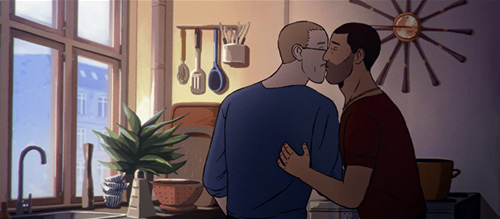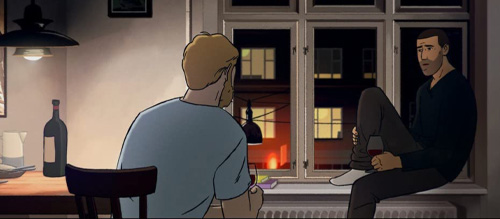Flee (2022) Review
Flee (2022)
Director: Jonas Poher Rasmussen
There’s a war raging in Eastern Europe. Vladimir Putin’s Russia has invaded neighbouring Ukraine to the disdain of the west. The conflict has thus far displaced millions of people and taken the lives of thousands. It’s shocking and horrendous. Most of all, it’s tragic.
The conflict in Ukraine right now is one of many we’ve been distant witnesses to over the past three decades, another footnote in our collective struggle to maintain peace between nations, between ideologies. Go back thirty years and a wide range of conflicts will filter into memory between the highs and lows of school, work and family life. Kosovo, Iraq and Afghanistan, Egypt, and Syria, to name but a few. They’re present to most of us, but so often presented as so much of an “other” that we rarely take the time to think about them. But what of the people that these conflicts, and the many more that have coloured in so many of our views on world politics, have displaced? What of the adults and children that were moved so far away from home? What of the families torn apart? Jonas Poher Rasmussen’s Danish animated docudrama Flee is one such account; a statement directly from a victim’s mouth on why we need to maintain a common decency approach to asylum. It’s a deep, dark, and an at-times harrowing recollection of one asylum seeker’s story that could of course be representative of millions.
Nominated for three Oscars in 2022 – Documentary Feature, International Feature, Animated Feature – Flee is a film like few others, a feature-length first-person take on seeking asylum that is a potentially perspective-shifting insight into the struggles of those looking for a helping hand in a world doing its best to maintain ideological division. It tells of a man, Amin Nawabi, born and raised in Afghanistan, who was forced to flee alongside his family after civil war broke out in the early 1990s. Speaking directly to the documentarian, Amin tells of growing up free spirited and hopeful, worshipping particular family members and always seeing himself as a little different. As he explains in gruesome detail with graphic specificity the struggles of his family’s forced abandonment of his home and the barriers they each faced in finding new ones, details of Amin’s relationship towards his old culture and that of which he has since embraced are stitched into his narrative, his status as a man on the verge of marrying another man (seemingly without any means of reuniting his family for such an occasion) making for some gut-wrenching cinema that is rightly at the forefront of this year’s Academy Awards.

Oscar-nominated actor-producer Riz Ahmed serves as executive producer alongside ‘Game of Thrones’ alum Nikolaj Coster-Waldau, a factor that is likely to have served in the film’s interest regarding international distribution for such a unique project. What they have tapped into by supporting this film of an LGBTQIA+ story from an asylum seeker flourishing in the West (both personally and professionally) after an ordeal of unimaginable proportions as a child, is a movie for our times; one that flies in the face of recent legislation that has seen countries such as the UK restricting the entry of Ukrainian nationals fleeing war.
As a piece of art Flee is an animated film first and foremost; or is that a documentary first and foremost? The animated half of the feature will likely prove divisive, as it’s not every day that the crowds frequenting documentary screenings are jumping at the chance to see animated films, and sadly the animation itself is hardly remarkable enough to warrant deep examination. While animated effectively, expressing the subject’s many unique memories with a realism-adjacent hand drawn-inspired look, it fails to light up the screen as many of the year’s best animated features do, and even fails to draw on basic animation principles (such as revisited colour schemes) to help narrate the story at hand. It’s a real shame, because Flee has perhaps the most genuine reason to be animated of all the feature films nominated in 2022 – the protection of the identity of the subject at its heart, the name Amin being a pseudonym – but its effectiveness is so small that it at times plays more as a shortcut that negates a traditional documentary’s need to acquire archival footage. There are moments in which it is quite effective, bringing an inherent dramatisation to the subject’s recollections that help to grow empathy with him, but it is the documentary that is the most compelling of the two sides to this particular coin; Amin’s story being so incredibly remarkable, so genuinely told, so honest, that it will act as a kind of exposé of the gross discrimination of our world’s ruling governments to those yet to be made fully aware. His story, through happiness, trauma, loss and terror is one that needs to be heard, but is sadly not unique. Amin is one of millions, and for that reason it hits even harder.
Documentaries are made and subsequently sold on the stories they tell, and Flee is absolutely no exception, its tale of an asylum seeker from Afghanistan trying to make it into Western Europe being one so harrowing and sadly so relevant that it is unmistakably important. And “important” is enough here. The animation doesn’t have to bounce off the screen, the score blare, the artistic elements of this production astonish; all it has to do is tell a truth about our world that some need to hear. All it needs to do is take a step towards convincing someone somewhere that their opinions on immigration law and asylum seekers should be reconsidered. While sadly audiences with such beliefs will likely never expose themselves to such messages, Flee is at least a snapshot of our war-ravaged times. It is, at least, a message from the past on how to better serve our future.
16/24


